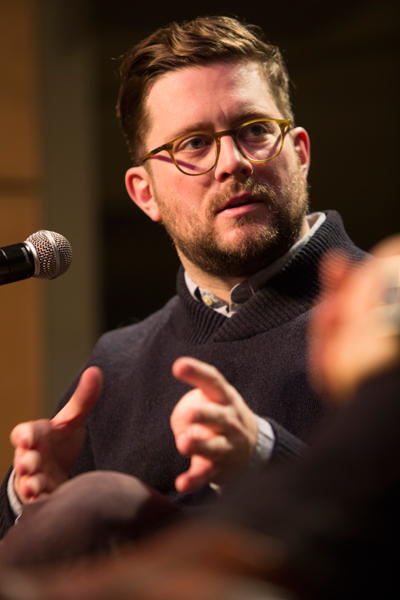Pitchfork's Chris Kaskie Finds the Signal in the Noise

Kaskie was interviewed by Berklee alumnus Panos Panay '94.
Photo by Kelly Davidson

Pitchfork's Chris Kaskie
Photo by Kelly Davidson

John Kellogg, Darla Hanley, Panos Panay, Chris Kaskie, and Don Gorder
Photo by Kelly Davidson
With the glut of media available today, the problem for consumers isn’t a lack of good music, but how to find that music. More than three times the number of albums were released in 2011 than in 2000, so finding trusted voices to help curate that volume is more important than ever. Internet radio station Pandora handles this by generating automated recommendations based on previously rated music, but Chris Kaskie, president of online music magazine Pitchfork, says that people are looking for a human voice, not an algorithm.
“Pitchfork is an entity that's a peer,” he says. “Like that friend who loves music.”
Interviewed for Berklee’s 20th annual Zafris lecture by alumnus Panos Panay ’94, founder and CEO of Sonicbids, Kaskie describes commercial radio as “utterly useless” (except to entertain his children when they don’t want to listen to his choices), because it goes too far in the other direction, playing the same 14 songs over and over again. He prefers to actively search for new music and finds it mostly by chance, on the Pitchfork staff forum, through peer groups on Twitter, and by following online breadcrumbs.
Considering this decentralized approach, how can Berklee students get themselves noticed by Pitchfork? Kaskie didn't have a direct answer. “We’re very insular,” he warned, finding new artists mostly through personal networks, so musicians need to connect with an individual more than the entity. When a student asked about the usefulness of sending the company an electronic press kit, Kaskie merely said that they strive to find bands “before the press kits are going out.”
He cautioned students about walking the fine line between building their brands and selling out, pointing to the example of Chairlift. The band struggled to avoid the stigma of selling out in some circles after its music was licensed for an iPod commercial.
Yet Kaskie was glad to see so many students attending the Music Business/Management Department lecture. “Learning about the business of music is way less sexy than just making it,” he said, but "it’s an important foundation."
For the business geeks in the crowd, Kaskie shared the fact that the site itself represents 80–85% of the company’s revenue. He recounted that in his first four months at Pitchfork, the company made more money than in the prior five years put together. A year after he joined, it launched its first festival, featuring Go Team, Tortoise, and the Decemberists. Tickets were $15 a day, there was no advertising except on the site—and attendance hit 20,000. While they didn’t make money off the festival for three years, Kaskie says, at least they didn’t lose any.
While Pitchfork’s popularity has grown since he first joined the team, for Kaskie, the numbers aren't the focus. “I don’t ever like to quantify success,” he says. He finds articles that garner few hits to be just as valuable as ones with more page views, if their readers are passionate. He describes the company as a “relative democracy,” where writers have the autonomy to write what they want, and their opinions matter.
According to Kaskie, Pitchfork is “not about being cool.” In fact, he described the vibe of the company’s three offices (one in Chicago and two in Brooklyn) as “surprisingly boring” and quiet, with the “music nerds” who work there listening to their own music through headphones and talking to each other over IM. The setting is a drastic change from his previous job at the Onion, but it does surround him with fellow music fans who constantly expose him to new artists—not algorithms.
